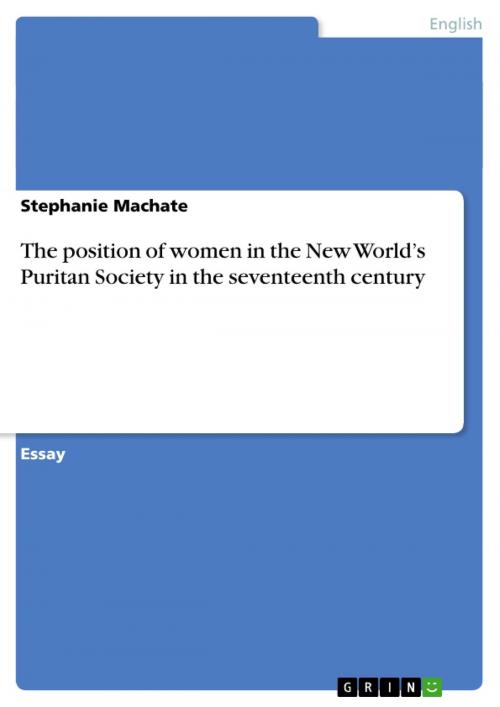The position of women in the New World's Puritan Society in the seventeenth century
Nonfiction, Entertainment, Drama, Anthologies| Author: | Stephanie Machate | ISBN: | 9783638813242 |
| Publisher: | GRIN Publishing | Publication: | June 16, 2007 |
| Imprint: | GRIN Publishing | Language: | English |
| Author: | Stephanie Machate |
| ISBN: | 9783638813242 |
| Publisher: | GRIN Publishing |
| Publication: | June 16, 2007 |
| Imprint: | GRIN Publishing |
| Language: | English |
Essay from the year 2004 in the subject American Studies - Culture and Applied Geography, grade: 1,0, Dresden Technical University, 8 entries in the bibliography, language: English, abstract: In order to examine women's status and life in a Puritan society in the New World, we first have to know why people left their native country. Marilyn J. Westerkamp tries to give some reasons in her book Women and Religion in Early America: In the early sixteenth century the Reformation arrived in England (3) and in the following decades a Puritan culture developed. A website1 tells us that in its core a description of man's direct relationship to God could be found and that thus no one needed a priest to contact God. At the beginning of the seventeenth century, the Puritan movement was attacked by Anglican bishops so that a few tried to flee. When Charles ? became monarch, a tendency of being less tolerant towards Puritan clerics grew; as a result of this many influential Puritans were arrested. Due to the fact that under the reign of this king numerous ceremonies were formalized and made more complex, the Puritans felt that religious ceremonies became artificial and thus their dissatisfaction grew. From 1628 on, they started to think of emigration to escape the monarch's control (Westerkamp 13). English Puritans founded in April 1630 a colony in the New World, called New England. Westerkamp calls this community, which was built in the wilderness, a 'holy experiment'. As New England was created with the help of England, but without an interference of the monarch (Westerkamp 14), it was possible to develop the colony independently from the oversea's monarchy. In this 'experiment' as many women as men were involved and due to the direct contact between God and the individual, religious power could be given to anybody (Westerkamp 11). Therefore the status and the role of a woman might differ to that in England.
Essay from the year 2004 in the subject American Studies - Culture and Applied Geography, grade: 1,0, Dresden Technical University, 8 entries in the bibliography, language: English, abstract: In order to examine women's status and life in a Puritan society in the New World, we first have to know why people left their native country. Marilyn J. Westerkamp tries to give some reasons in her book Women and Religion in Early America: In the early sixteenth century the Reformation arrived in England (3) and in the following decades a Puritan culture developed. A website1 tells us that in its core a description of man's direct relationship to God could be found and that thus no one needed a priest to contact God. At the beginning of the seventeenth century, the Puritan movement was attacked by Anglican bishops so that a few tried to flee. When Charles ? became monarch, a tendency of being less tolerant towards Puritan clerics grew; as a result of this many influential Puritans were arrested. Due to the fact that under the reign of this king numerous ceremonies were formalized and made more complex, the Puritans felt that religious ceremonies became artificial and thus their dissatisfaction grew. From 1628 on, they started to think of emigration to escape the monarch's control (Westerkamp 13). English Puritans founded in April 1630 a colony in the New World, called New England. Westerkamp calls this community, which was built in the wilderness, a 'holy experiment'. As New England was created with the help of England, but without an interference of the monarch (Westerkamp 14), it was possible to develop the colony independently from the oversea's monarchy. In this 'experiment' as many women as men were involved and due to the direct contact between God and the individual, religious power could be given to anybody (Westerkamp 11). Therefore the status and the role of a woman might differ to that in England.















